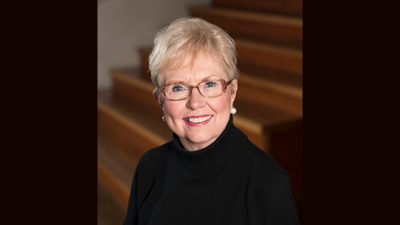Former Mayor Kay Barnes is UMKC’s Alumna of the Year
Downtown Kansas City, Missouri’s current prosperity and growth is a result of the blueprint created by the Honorable Kay Barnes (M.A. ’71, M.P.A. ’78), the city’s first woman mayor. The city’s downtown population surged from 4,000 in 2002 to 26,000 in 2017, just one piece of the transformation at the city’s center. Barnes’ tenacity and leadership as mayor from 1999-2007 inspired a multi-billion dollar campaign for the revitalization of downtown Kansas City — including construction of the Power & Light District and the Sprint Center.
Barnes has been a tireless champion for women. She helped establish Central Exchange, a local organization committed to helping women achieve their greatest potential, as well as the UMKC Women’s Center, providing programming and support for women on campus. In 2015, Barnes was inducted into the Starr Women’s Hall of Fame. She now serves as Senior Academic Liaison and Ambassador for Park University and has been a frequent guest lecturer at UMKC’s Bloch School of Management.
Her career achievements have earned her one of the highest honors bestowed by the University of Missouri-Kansas City and its Alumni Association: the 2018 UMKC Alumna of the Year.
Barnes recently discussed her career achievements with UMKC:
Your political career began in the 1970s as one of the first two women in the Jackson County legislature. Did you always want to pursue a career in government/politics?
Two experiences during my youth led me toward politics. One was my exposure to Walter Cronkite, the famed CBS news anchor. His father and my father were brothers, Walter being my first cousin. (My maiden name is Cronkite.) Growing up in St. Joseph, Missouri, I had the opportunity to be around Walter on multiple occasions and “learned” that being a public figure was a good thing in my family. This is in contrast to the negativism many have, particularly women, in getting involved politically because of the public nature of the endeavor.
The other experience was spending a summer in Washington, D.C., when I was in high school and my father was the chief of staff to our Congressman. It was an amazing experience being in and out of the House and Senate galleries many times, as well as having access to other events of that summer, including the Sen. Joseph McCarthy hearings and civil rights debates. It enabled me to observe political life up close, and I was intrigued.
You were elected in 1999 as the first female mayor of Kansas City. Did you face gender-based resistance or underestimation — or even bullying? How did your election change KC and the region for women?
It was an exciting honor to be elected as the first female mayor of Kansas City. Perhaps the strongest “underestimation” of me going into office was that I wouldn’t have any interest or skills in economic development. Having served in elected office for eight years on the county legislature and the City Council of Kansas City, I’d had considerable exposure to the field of economic development. Also, just prior to running for mayor, I’d served as chair of the Tax Increment Finance Commission. As a result, I brought a base of understanding and experience to the world of economic development – and certainly learned a great deal more during my eight years as mayor.
Being the first female mayor of Kansas City, Missouri, coincided with a period when the mayors of Kansas City, Kansas, Lee’s Summit, and Leawood were also female. So we all contributed to a growing acceptance of women in mayoral roles.
How did you come to realize that downtown Kansas City needed a revitalization? What was the key first step that jump-started the process?
In my role as chair of the Tax Increment Finance Commission, I learned first-hand about the multiple challenges facing Kansas City’s downtown. Also, as a member of the Greater Kansas City Sports Commission, I knew of the growing impetus for a new arena to be located in the downtown loop. At that time, the Commission supported a study to determine the viability of a new arena, both with or without a professional sports franchise. The study clearly showed that a new arena could do well with or without an NBA or NHL franchise. This result propelled further exploration not only regarding a new arena but also the overall revitalization of the greater downtown area.
Each year, the UMKC Alumni Association recognizes individual alumni and one family with top honors. UMKC will honor Mayor Barnes and other outstanding alumni at the 2018 Alumni Awards Event Friday, June 15, on campus. The reception is one of the university’s largest events and proceeds support student scholarships. In the last decade, the Alumni Awards event has garnered more than $1 million in scholarships and immediate aid for students.
Click here for tickets or sponsorship information for the June 15, 2018, Alumni Awards Event.
Click here for more information on the 2018 Alumni Award recipients.

